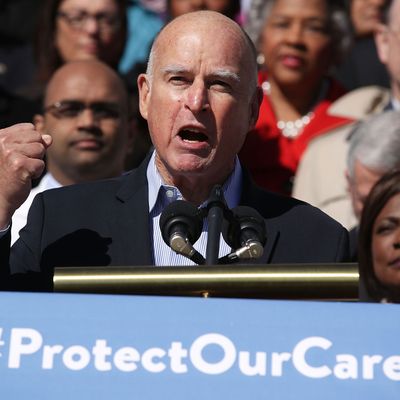
Amid all the appropriately intense discussion of the terrible things states would be allowed to do to people with preexisting conditions in the health-care bill the House is considering today, there is some danger of obscuring the bigger picture. Trumpcare, at least in its current form, will allow states to decide whether to carry on with something resembling the systems in place under Obamacare, or to opt out of various key requirements under current law — including the one protecting people with preexisting conditions. It seems safe to assume that most blue states will not even consider applying for waivers to screw over their own most vulnerable citizens. But at the same time, there are many provisions in the revised American Health Care Act that will affect people everywhere, often not in a good way.
States like New York, California, Illinois, Massachusetts, Pennsylvania, and Virginia — states with Democratic governors and/or legislatures — are not going to seek exemptions from Obamacare requirements affecting the essential benefits health plans must offer, or prohibiting discrimination on the basis of health conditions. And there may be other states that don’t accept the poisoned chalice of health-policy autonomy. One of the House Republicans who seems to be coming around to a vote for Zombie Trumpcare, Carlos Curbelo, offered that excuse, even for his own red state of Florida:
I would highly doubt that any governor, especially the governor of a large state like Florida, would seek a waiver. I just don’t think that any state would want to carry the burden of managing health care more than they already do, through Medicaid.
Actually, it’s not clear that most of the people priced out of the individual health-care market by preexisting conditions would qualify for Medicaid, particularly in non-expansion states like Florida. But it is true that applying for the waivers that the House Freedom Caucus demanded will at least be controversial in the states that consider it.
For many of Zombie Trumpcare’s provisions, however, there’s not really much state flexibility at all. Indeed, blue states — most of which took advantage of Obamacare’s optional expansion of Medicaid — will be most affected by the bill’s abrupt termination of enhanced federal funds for the expanded population. Indeed, of the 24 million Americans the Congressional Budget Office estimated would lose health coverage under the original Trumpcare bill, 14 million would lose Medicaid coverage.
Some of the Obamacare regulations Zombie Trumpcare seeks to revoke and/or replace also are not optional, including the expansion of allowable price discrimination based on age and the elimination of the individual purchasing mandate (to be replaced by a surcharge on people who wait to buy insurance until they are sick).
Zombie Trumpcare also gets rid of the tax subsidies set up by Obamacare, and creates its own tax-credit system, with arguably very insufficient credit amounts, especially for low-income and older people. None of this can be waived for any states.
And the cost-sharing-reduction subsidies that have been critical in keeping insurers offering coverage under the Obamacare exchanges — the subsidies the administration has been threatening off and on to withhold — would be formally killed as well.
Finally, there are all sorts of little-recognized side effects of Zombie Trumpcare — such as the unraveling of benefit requirements for employer-sponsored health insurance — that do not discriminate by geography. And there is one big national provision that could do vast damage to women’s health care, especially in rural areas: the prohibition on any federal funds for Planned Parenthood.
It is worth watching closely the special provisions cooked into this legislation that affect certain states exclusively. The original AHCA (and hence its successors) included a deal to secure votes from upstate New York GOP House members that shifted Medicaid costs from county to state taxpayers. More of that sort of home cooking could be tucked into the legislation later.
We have no way of knowing what the Senate will do to the “state flexibility” provisions that have been so important to Zombie Trumpcare’s struggle towards House passage. On the one hand, there may be some “moderate” GOP resistance to how far conservative states will be allowed and encouraged to go in messing with poorer and sicker people who have benefited from Obamacare. On the other hand, some Republican senators—notably Bill Cassidy and Susan Collins—want to go much further in allowing states to go their own way, to the point of letting blue states keep most of Obamacare in place.
For blue-state progressives, this may be a tempting approach insofar as it insulates them from much of the damage wrought by an Obamacare replacement. But they need to ask themselves if they are willing to sell vulnerable red-state people down the river and accept a sort of health-policy apartheid. Republicans may not actually give them a lot of choice, but it’s important for everyone to understand the trade-offs involved in getting this unwieldy beast of a health-care bill to Donald Trump’s desk.






























